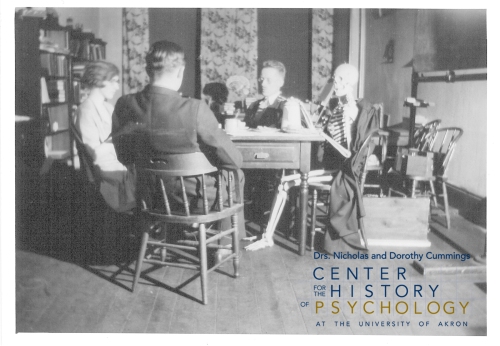-contributed by Arianna Iliff.
As a Graduate Student Assistant here at the CCHP, I get to explore our collections for researchers and find resources to assist them in their research. In the process of doing so, I find some truly interesting gems, and record them in a word document called “Nifty Surprises.” I thought I would share some with you today:

Molly Harrower papers, OS67, map case 5
I’ve had the chance to get to know Molly Harrower: not just as a psychologist, but as a person. She was a skilled writer, and throughout the Harrower papers, you can even find snippets of poetry. But did you know that we have her “Bachelor of Square Dancing” degree?

Molly died in 1999. If Molly were alive today, I bet she’d get a huge kick out of internet cat videos–clearly a gal after my own heart. Molly Harrower papers, OS67, map case 5.
How about this lovely chalk drawing of her cat? That’s one thing that I’ve enjoyed about my time here: when you have access to data, manuscripts, and unexpected errata such as this, history becomes more tangible than anything you could read in a textbook.
—

I wish my favorite author would send me an autographed pamphlet. I’m not bitter though. Abraham Maslow Papers, box M4413, folder 7.
Finding this gem made my jaw drop: “THE Aldous Huxley? Sci-fi writer extraordinaire?” Oh yes! Abe Maslow and Aldous Huxley were indeed friends, due to their mutual interest in peak experiences and the Human Potential Movement. Interestingly, one of my favorite family therapists, Virginia Satir, was also a part of the movement!
—

Henry H. Goddard papers, V37, folder 2.
Stay with me on this one: okay, have you seen Mad Max: Fury Road? You know that scene where Charlize Theron as Imperator Furiosa aims a shot off of Max’s shoulder? My first thought when I found this image in the Goddard Papers was of exactly that!
Unfortunately, this image is not labeled with names or any such identifiers, and we don’t know who these people were in relation to Goddard. So when I think of this image, I just think of it as “that picture of early 20th century Max and Furiosa.”
—

Three grad students, studying at a table with a model human skeleton. Caption: Caption on reverse states “graduate student life at Clark,” listing the names Dorothea Johannsen (Crook), Mason N. Crook, Robert W. Leeper, and Bony. AHAP Still Images collection, V35, folder 6.
When I came across this photo in our photo archives, I think that as a second-semester graduate student, I related to Bony the skeleton on a spiritual level. I felt that this photo needed a hilarious caption, such as “I’m coping with the workload just fine,” or “finals week is a real killer,” or perhaps ”I choose the sweet embrace of death over one more day in this program.”
On a serious note, I’ll say this: as an undergraduate, I chose studying sociology over psychology because for some reason, the sociological perspective was easier for me to connect with. However, since I’ve been working at the CCHP, I’ve had the opportunity to physically touch history, learning while helping others learn. Most people are surprised when I tell them the only place like this in the world is in Akron, but the fact of the matter is that the famous psychologists we learn about in 100-level classes, or whose research we draw upon, are more than just vague, long-deceased monoliths, but human beings who lived, worked, and thought. It excites me tremendously that you, too could experience history like I have, once our museum re-opens to the public. I hope you’ll stop on by!



